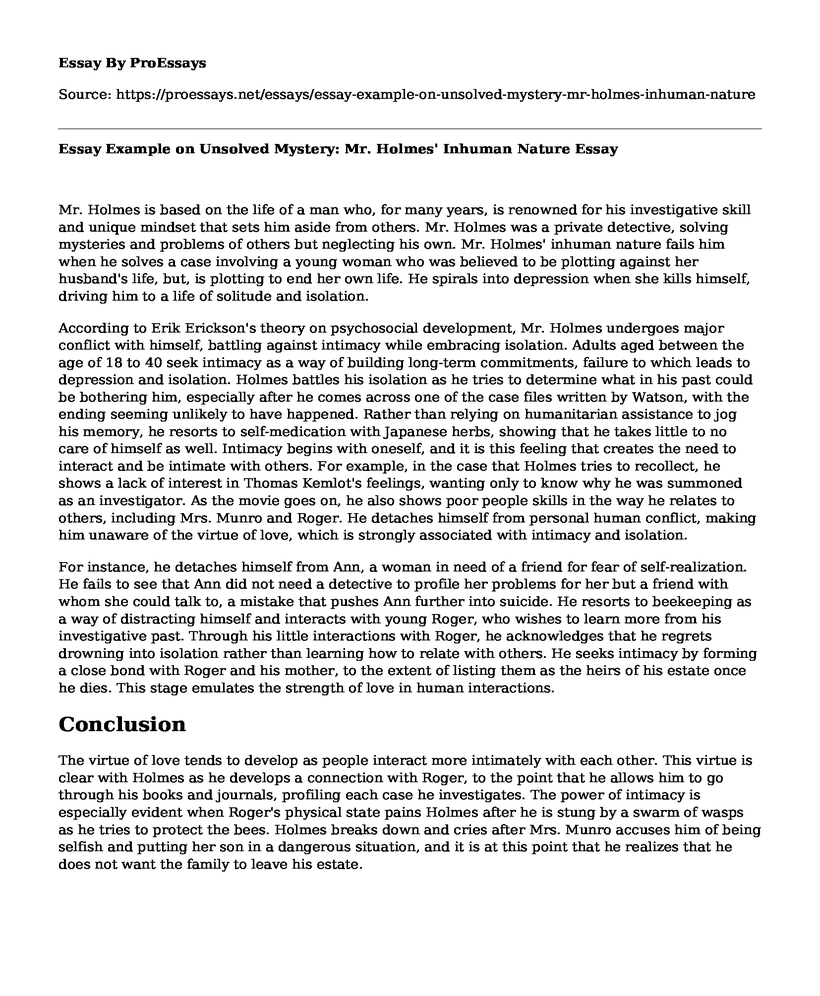Mr. Holmes is based on the life of a man who, for many years, is renowned for his investigative skill and unique mindset that sets him aside from others. Mr. Holmes was a private detective, solving mysteries and problems of others but neglecting his own. Mr. Holmes' inhuman nature fails him when he solves a case involving a young woman who was believed to be plotting against her husband's life, but, is plotting to end her own life. He spirals into depression when she kills himself, driving him to a life of solitude and isolation.
According to Erik Erickson's theory on psychosocial development, Mr. Holmes undergoes major conflict with himself, battling against intimacy while embracing isolation. Adults aged between the age of 18 to 40 seek intimacy as a way of building long-term commitments, failure to which leads to depression and isolation. Holmes battles his isolation as he tries to determine what in his past could be bothering him, especially after he comes across one of the case files written by Watson, with the ending seeming unlikely to have happened. Rather than relying on humanitarian assistance to jog his memory, he resorts to self-medication with Japanese herbs, showing that he takes little to no care of himself as well. Intimacy begins with oneself, and it is this feeling that creates the need to interact and be intimate with others. For example, in the case that Holmes tries to recollect, he shows a lack of interest in Thomas Kemlot's feelings, wanting only to know why he was summoned as an investigator. As the movie goes on, he also shows poor people skills in the way he relates to others, including Mrs. Munro and Roger. He detaches himself from personal human conflict, making him unaware of the virtue of love, which is strongly associated with intimacy and isolation.
For instance, he detaches himself from Ann, a woman in need of a friend for fear of self-realization. He fails to see that Ann did not need a detective to profile her problems for her but a friend with whom she could talk to, a mistake that pushes Ann further into suicide. He resorts to beekeeping as a way of distracting himself and interacts with young Roger, who wishes to learn more from his investigative past. Through his little interactions with Roger, he acknowledges that he regrets drowning into isolation rather than learning how to relate with others. He seeks intimacy by forming a close bond with Roger and his mother, to the extent of listing them as the heirs of his estate once he dies. This stage emulates the strength of love in human interactions.
Conclusion
The virtue of love tends to develop as people interact more intimately with each other. This virtue is clear with Holmes as he develops a connection with Roger, to the point that he allows him to go through his books and journals, profiling each case he investigates. The power of intimacy is especially evident when Roger's physical state pains Holmes after he is stung by a swarm of wasps as he tries to protect the bees. Holmes breaks down and cries after Mrs. Munro accuses him of being selfish and putting her son in a dangerous situation, and it is at this point that he realizes that he does not want the family to leave his estate.
Cite this page
Essay Example on Unsolved Mystery: Mr. Holmes' Inhuman Nature. (2023, Feb 23). Retrieved from https://proessays.net/essays/essay-example-on-unsolved-mystery-mr-holmes-inhuman-nature
If you are the original author of this essay and no longer wish to have it published on the ProEssays website, please click below to request its removal:
- Hidden Meaning of Recitatif by Toni Morrison Essay
- Research Paper on Hawaiian Music. Example.
- Essay Sample: Theme of Desperate Housewives in the "The Yellow Wallpapers" and "Bloodline"
- Genres of Writing Analysis Paper Example
- The Yellow Wallpaper Response Paper
- The Yellow Wallpaper: The Effects of Postpartum Depression of Women
- Movie Analysis Essay on "The Godfather"







